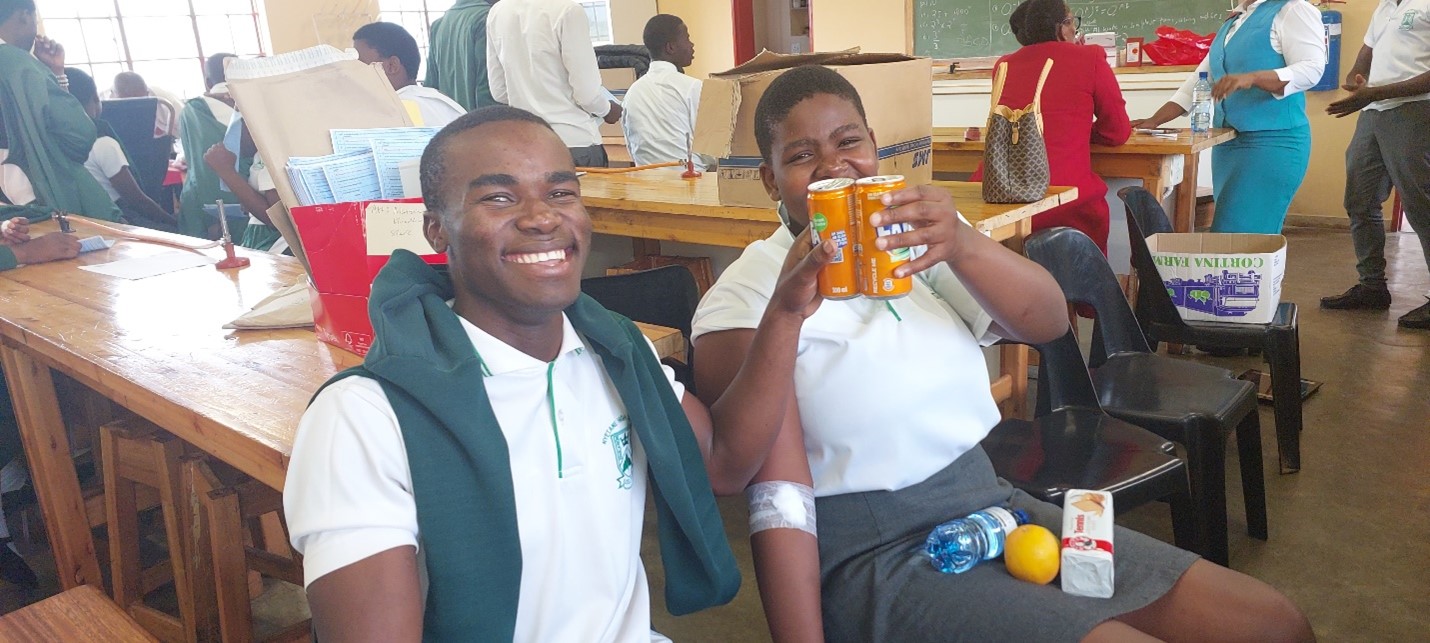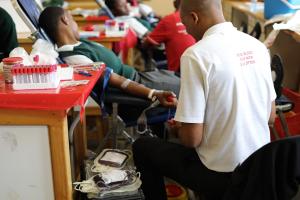GIVE BLOOD, GIVE NOW, GIVE OFTEN
“Blood transfusion saved my life, so I know how important it is to donate blood” - Mphikeleli Mlotsa.
In 2023 during school break, Mphikeleli Mlotsa, a Form 4 student at Nyetane High School was involved in a grisly car accident that almost cost him his life. The accident occurred at a time when the Blood Transfusion Service was experiencing a blood shortage topped by inadequate people to donate blood as school-going children were on break, yet the blood bank targets them during blood drives. Thanks to the blood donation of well-wishers, Mlotsa was able to receive blood that played a huge role in his recovery and months later inspired him to donate blood during a blood drive at his school organized by the Ministry of Health.
“I needed a lot of blood since I had excessive bleeding during the accident and without a blood transfusion I was going to die.”

The blood shortages experienced in 2023 hurt Eswatini’s healthcare system, increasing morbidity and mortality rates due to delayed medical interventions. Blood shortages caused interruptions of services leading to failure in supporting maternal and neonatal cases, renal cases, cancer network cases, trauma/ road traffic accident cases, and management of chronic illnesses such as HIV/AIDS and orthopedic surgical campaigns which were being conducted at the time. To mitigate the effects of the blood shortage in the country, the World Health Organization Eswatini (WHO) stepped in to support the Eswatini National Blood Transfusion Service (ENBTS) organize and conduct regional blood drives in high volumes within 14 days targeting Lubombo and Northern Hhohho Regions. From the campaign, the Blood Transfusion Service was able to collect 1054 units out of the targeted 2000 units limit they had set.
“I am grateful that I eventually got the blood, and I would like to encourage school-going children to donate blood because you never know what may happen tomorrow, one day it may save your parent, your relative, or even yourself. It always feels good to help someone in need, especially when saving a life, hence I will continue to donate blood even when I am an adult,- Mphikeleli Mlotsa.
During the drive, the EBNTS mobilized four teams who were instrumental in covering more ground leading to the success of the activity. Recently, the Eswatini National Blood Transfusion Service introduced 350ml bags to allow people weighing 45kgs to donate blood which was previously not possible. After collecting blood, it was sent to the laboratory for testing of quality and thereafter hospitals could make requests to collect and use the blood. The collected blood has a shelf life of 42 days, and the Eswatini National Blood Transfusion Service ensures that it is safely stored at the right temperature for future use. They use the fifolifo (first come is the first to leave ) concept to ensure that stored blood does not go bad.
“The blood is free to both the public and private hospitals. People can donate blood at their nearest blood centers in Mbabane, Manzini, and Hlatikhulu.” Mlamuli Nxumalo – Nurse Team leader at the blood bank.”
The Eswatini National Blood Transfusion Service has quality officers who ensure the quality of blood is per the WHO recommended Standard Operating Procedures.
‘Imagine you are involved in an accident, and they ask you if you need blood, whose blood do you think will be used? This blood is usually from willing donors and thus, I would urge the public to donate whenever they can” - Mlamuli Nxumalo.
To donate blood, visit the nearest health centers below:
- Mbabane: Adjacent to Mbabane Government Hospital
- Manzini: Corner of Mancishane and Martin Street, behind the Post Office.
NB: You can donate blood as frequently as every three months without affecting your health
Requirements for donating blood
- Ages between 16-65 years. Children under 18 need to come with a parent or signed parental consent.
- Weigh 45kgs and upwards
- Non-pregnant and non-breastfeeding
